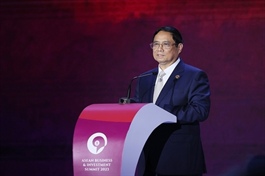HCM City seeks to become locomotive driving VN’s digital economy
HCM City seeks to become locomotive driving VN’s digital economy
HCM City is intensively promoting the development of its digital economy so that it can account for 20 per cent and 40 per cent of its economy by 2025 and 2030 as targeted.

Lâm Đình Thắng, director of the HCM City Department of Information and Communications, speaks at a seminar on promoting the development of HCM City’s digital economy on September 7. — Photo courtesy of nld.com.vn |
Lâm Đình Thắng, director of the Department of Information and Communications, told a seminar on promoting the digital economy on September 7 that the Politburo’s resolution last year on the city’s development by 2030 envisages it becoming a locomotive for the nation’s digital economy and society.
The digital economy made up an estimated 18.66 per cent of the city’s economy last year, up from 15.38 per cent in 2021, he said.
The city has made great efforts to promote the online economy, but faces three major challenges, he said.
Many sectors and even management agencies do not have enough awareness about the digital economy, the methods and tools used to measure the digital economy are not the same at relevant agencies and organisations and there is a lack of policies and resources to support small and medium-sized enterprises, he said.
Assoc Prof Dr Trần Minh Tuấn, director of the Department of Digital Economy and Digital Society at the Ministry of Information and Communications, said: “Over the past 30 years HCM City has developed very well in the old space but has reached its limit and needs a new development space. The digital economy will bring that new space to the city.
“To grow faster, the city needs a new production technology like digital technology, a new production resource like digital human resource, a new production factor like digital data, and a new driving force like digital innovation.”
He said the digital economy has gradually become a strong driving force for the city’s steady and sustainable growth based on four pillars: ICT industry, digital transformation of industries, digital governance, and data valuation.
Going forward, he said manufacturing, textiles, logistics, agriculture, and tourism need to focus on the digital economy.
To develop the digital economy, the city needs to quickly move some aspects of its economy online and universalise Vietnamese artificial intelligence (AI) applications, he added.
Phạm Bình An, deputy director of the HCM City Institute for Development Studies, said though in the early stages of development the city’s digital economy has some outstanding results, especially in e-commerce, e-payment and online travel.
To promote its development, the city needs to develop digital infrastructure and platforms and exploit data, he said.
The National Assembly’s Resolution 98 allows the city to experiment with mechanisms and policies that would foster digital and green economy development, and it should take advantage of that, he added.
Delegates at the seminar said the city needs to focus on human resources to serve its digital economic development.
It also needs policies that encourage businesses to embrace digital technology since that rate is still low, they added.
Đào Bá Khương, general director of Royal Sachi JSC, said businesses, regardless of their size, need to apply information technology if they want to go far.
The human resource factor also plays an important role along with Government policies and enterprises’ use of them, he added.
























